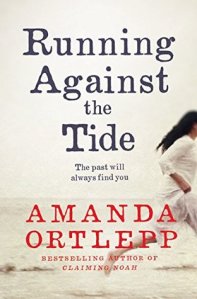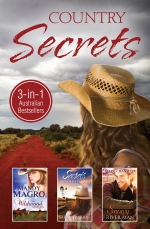 I made a false start when I first picked up Amanda Ortlepp’s Running Against the Tide. I’m not sure of the mood I was in, but the idea of a woman running away with her two teenaged sons to a remote part of South Australia to escape an unhappy marriage didn’t instantly appeal to me. Maybe I’d been listening to too much news. When I recently got back to the book, I’m glad I returned to it. It’s worth the read.
I made a false start when I first picked up Amanda Ortlepp’s Running Against the Tide. I’m not sure of the mood I was in, but the idea of a woman running away with her two teenaged sons to a remote part of South Australia to escape an unhappy marriage didn’t instantly appeal to me. Maybe I’d been listening to too much news. When I recently got back to the book, I’m glad I returned to it. It’s worth the read.
Running Against the Tide introduces Erin Travers and her two sons, Mike and Ryan. Nineteen-year-old Mike is the sociable one, willing to yarn with the kindly-and-not-too-nosy neighbours, oyster-farmer Jono and his wife Helen. Ryan is the one you have to worry about: taciturn, possibly anti-social – or a typical fifteen-year-old grieving the absence of his gambler father? Erin herself is struggling to find her feet back in the remote town where she grew up, dating again, but attracted to men who may not have her best interests at heart; struggling to find peace and privacy in a place where everyone knows each other’s business.
Throw into this family mix bullying, intrigue, theft and arson and you have a good, suspenseful read.
For me, the real star of the book is the setting, South Australia’s Eyre Peninsula, and the slow pace of life of Jono’s oyster farming.
Sully pulled the punt level with the line and Jono slipped over the side with a satisfied sigh. Mike dropped into the water behind him. The water was so warm today, they didn’t even need their waders. On days like this, waist deep in warm water with the sun on his back, there was nowhere Jono would rather be. Even in winter, when the cold penetrated his waders and rain felt like pinpricks on his face, he knew it was still better than working in a cubicle day after day, dealing with customers and demanding bosses. The lease was his office and unlike people, oysters were easy to deal with: quiet, compliant and predictable. (89-90)
Well, almost. Jono is soon to discover even oyster farming has its trial.
Ortlepp describes the remote coastal region of Mallee Bay with such precision and beauty I was sure the township must exist. I even looked for it on Google maps and congratulated myself when, after following the clue that it’s 500 kilometres from Adelaide, I worked out it must be based on the real-life town of Cowell. I needn’t have gone to the trouble: Ortlepp notes in the Acknowledgements that Cowell was the inspiration, a town where her grandparents lived in the latter part of their lives and which she visited as a child. Now I want to go there, too!
If you like a mix of psychological suspense and intrigue with your family drama, you’ll enjoy Running Against the Tide.
~
 PS My novel Snowy River Man is now available in print as part of the “3-in-1 Australian Bestsellers” anthology, Country Secrets, published by Harlequin Mira, alongside novels by Mandy Magro and Sarah Barrie. To celebrate, I’m giving away two copies of the anthology to Australian residents, or your choice of either Snowy River Man or By Her Side as ebooks, if you’re outside Australia. You can find details on how to enter on my Lizzy Chandler author blog here. Entries close 31 August.
PS My novel Snowy River Man is now available in print as part of the “3-in-1 Australian Bestsellers” anthology, Country Secrets, published by Harlequin Mira, alongside novels by Mandy Magro and Sarah Barrie. To celebrate, I’m giving away two copies of the anthology to Australian residents, or your choice of either Snowy River Man or By Her Side as ebooks, if you’re outside Australia. You can find details on how to enter on my Lizzy Chandler author blog here. Entries close 31 August.
~
Author: Amanda Ortlepp
Title: Running Against the Tide
Publisher: Simon & Schuster, 2016
ISBN: 9781925030631
This review forms part of my Australian Women Writers Challenge 2016. My thanks to the publishers for a review copy.




